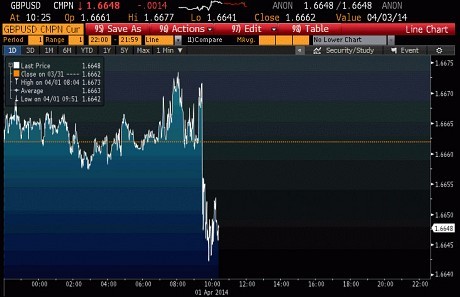Pound Falls Versus Dollar as Slows Bloomberg Business
Post on: 30 Март, 2015 No Comment

Oct. 14 (Bloomberg) — The pound fell to an 11-month low against the dollar as a report showed U.K. inflation slowed to the least in five years last month, adding to pressure on the Bank of England to keep interest rates at record lows.
Sterling weakened versus all but two of its 16 major peers after a report showed annual consumer-price growth slowed to 1.2 percent, from 1.5 percent in August. U.K. 10-year government bonds climbed for a seventh day, the longest winning run since August 2011, pushing the yield to the lowest in more than a year. Yields on two-year gilts, more sensitive to rate expectations, fell the most since August, while short-sterling futures contracts rose.
“The market spent the first half of the year getting excited about how quickly the BOE might have to hike,” said Daragh Maher, a foreign-exchange strategist at HSBC Holdings Plc in London. “Now they’re having to delay those expectations. The real surprise is that there’s not been an even bigger sterling selloff in response to this sizable downside surprise.”
The pound fell 1 percent to $1.5926 as of 4:36 p.m. London time after dropping to $1.5905, the lowest since Nov. 13. Sterling depreciated 0.3 percent to 79.50 pence per euro and reached 79.61 pence, the weakest level since Sept. 17.
Today’s consumer-price data mark a ninth month below the BOE’s 2 percent inflation target. A separate report from the British Retail Consortium and KPMG LLP showed retail sales unexpectedly fell last month from a year earlier.
Like-for-like retail sales dropped 2.1 percent in the year through September, compared with the 1 percent increase predicted by economists surveyed by Bloomberg.
Rate Expectations
Forward contracts based on the sterling overnight interbank average, or Sonia, showed investors have pushed back bets on a 25 basis-point increase in borrowing costs to after September, from February just two months ago. The implied yield on short-sterling futures contracts expiring in December 2015 fell as much as 13 basis points, or 0.13 percentage point, to 1.02 percent.
“This figure eliminates any chance of a rate rise this year and bets of a hike in Q1 will be scaled back considerably,” said Harry Adams, the head of trading at Argentex LLP, a currency advisory company in London. “Sterling is likely to be punished by the dollar as European risks accelerate.”
The U.K. 10-year break-even rate, the difference between yields on gilts and index-linked securities, dropped to as low as 2.59 percentage points today, the least since November 2012.
BOE Governor Mark Carney said in a CNBC interview yesterday that weak global demand is producing a benign inflation backdrop.
‘On Hold’
“The Bank of England is going to stay on hold much longer,” Manish Singh, who helps oversee $2 billion as head of investments at Crossbridge Capital in London, said in an interview on Bloomberg Television’s “On The Move” with Jonathan Ferro. “They have been giving this indication in their last few communications.”
Royal Bank of Scotland Group Plc pushed back its forecast for the first rate increase by the BOE to August from February, strategists Ross Walker and Andrew Roberts wrote in an e-mailed note today.
The 10-year gilt yield dropped four basis points to 2.13 percent and touched 2.07 percent, the lowest since June 2013. The 2.75 percent bond due in September 2024 climbed 0.38, or 3.80 pounds per 1,000-pound face amount, to 105.545.
Rates on two-year gilts dropped as much as nine basis points to 0.56 percent, the lowest level since Feb. 28.
‘Further Stimulus’
“The U.K. data reinforce the increasingly acknowledged theme of weakening global growth,” Rabobank International strategists led by Richard McGuire, the London-based head of European rates strategy, wrote in an e-mailed note.
Weak price growth “stands to challenge rate-hike expectations on both sides of the Atlantic, while it is not inconceivable that, as inflationary pressures continue to subside, speculation could ultimately build over the need for further stimulus,” the strategists wrote.
Gilts are the best-performing sovereign securities tracked by Bloomberg World Bond Indexes in the past month, having risen 3.2 percent through yesterday. Euro-area government securities gained 1 percent and U.S. Treasuries 1.9 percent.
To contact the reporter on this story: Lucy Meakin in London at lmeakin1@bloomberg.net
To contact the editors responsible for this story: Paul Dobson at pdobson2@bloomberg.net Keith Jenkins














